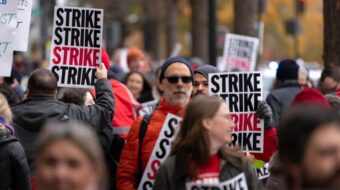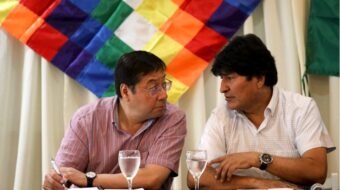Aggressive maneuvers against Venezuela from the Bush government have reached new heights. Here are some indicators.
That a coup against Venezuelan President Hugo Chávez was under way when opposition parties opted out of Venezuela’s December parliamentary elections was not obvious. But at the time Vice President José Vicente Rangel alleged that the U.S. Embassy was “extremely active” behind the scenes.
During the elections, explosions went off, an oil pipeline was blown up and electric substations were burned. Almost 100,000 soldiers were deployed to protect polling places. Authorities unearthed caches of weapons and ammunition. Two U.S. warships were cruising off the Venezuelan coast.
In fact Venezuelan authorities already knew of a coup planning meeting in Bogotá, Colombia, attended by a U.S. government official named “Thomas,” plus dissident Venezuelan military figures and Colombian intelligence officers. Some 500 Colombian paramilitary troops crossed the Colombian-Venezuelan border prior to the elections.
On Jan. 27, the Venezuelan government expelled naval attaché John Correa, stationed at the U.S. Embassy. Security personnel had infiltrated the group of Venezuelan junior officers recruited by Correa. The Bush government retaliated by sending a Venezuelan diplomat back to Caracas.
Another item: the Bush administration is blocking Spain’s $1.7 billion sale of military aircraft and boats to Venezuela. It claims that U.S. technology was used in the planes’ manufacture. According to Chávez, Venezuela may end up buying planes from China or Russia. U.S. Defense Secretary Donald Rumsfeld has berated Venezuela for spending on military hardware rather than provide for people’s needs.
Rumsfeld on Feb. 2 compared Hugo Chávez to Hitler, declaring, “We’ve got Chávez in Venezuela. … He’s a person who was elected legally, just as Adolf Hitler was elected legally. … He is working closely with Fidel Castro and Mr. Morales and others. It concerns me.”
Intelligence director John Negroponte is worried too. In recent Senate testimony, he warned that if Chávez wins re-election this year, he will “use his control of the legislature and other institutions to continue to stifle the opposition, reduce press freedom, and entrench himself through measures that are technically legal, but which nonetheless constrict democracy.”
Lawyer Eva Golinger, writing in venezuelanalysis.com, sees “a scary escalation of aggression … Rumsfeld and Negroponte represent the two entities in the United States that wage war: Defense and Intelligence.”
She reports that the U.S. government will be sending $9 million this year to opposition groups in Venezuela. She refers to an October 2005 U.S. Army publication, “Doctrine for Asymmetric War Against Venezuela,” in which Chávez and the Bolivarian Revolution were labeled as the “largest threat since the Soviet Union and communism.”
The Arabic news service Aljazeera has recently opened an office in Caracas and announced plans for cooperation with Telesur, the new Latin American news agency funded by Venezuela, Argentina, Uruguay and Brazil. Florida Republican Rep Connie Mack (R-Fla.) could hardly contain himself: “Today Chávez has gone even further. It wasn’t enough for him to spread his socialist propaganda throughout Latin America. Now he’s in cahoots with the original terrorist TV.”
Mack introduced House Resolution 328 last month. In the name of “true democracy,” it asks for “assistance and material support” for opposition groups in Venezuela, the funding to be funneled through U.S. Agency for International Development and the National Endowment for Democracy.
The Bush administration has found one overseas ally. Former Spanish president and right-winger José María Aznar now heads up the Foundation for Social Studies and Analysis. That well-financed group recently announced that it is concentrating this year on “a region caught up in populism and indigenous stirrings in the dark shadow of an alliance between Fidel Castro and the Venezuelan Hugo Chávez,” something it called an “explosive situation.” That would be Latin America.









